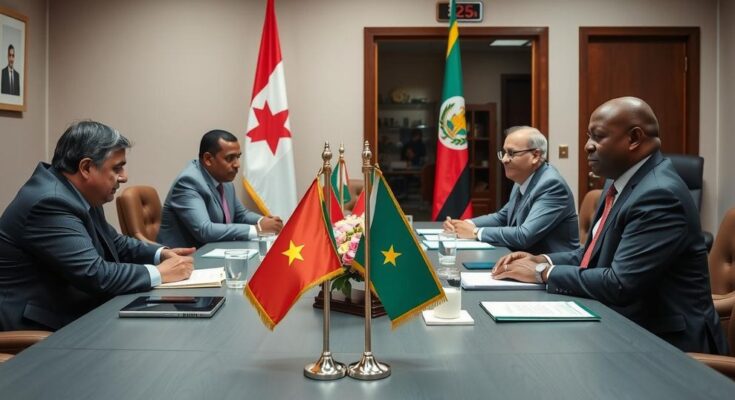Egypt has strengthened its alliances with Eritrea and Somalia to counter Ethiopia’s increasing influence in the Horn of Africa. A recent summit in Asmara focused on military cooperation, with Egypt pledging troop deployment for Somalia’s counterterrorism efforts. This alliance emerges in the context of tensions related to the Grand Ethiopian Renaissance Dam and Ethiopia’s maritime agreement with Somaliland, which has further strained regional relations.
Cairo has taken significant steps to reinforce its strategic alliances with Eritrea and Somalia, perceiving increasing threats from Ethiopia towards its regional interests. In October 2024, leaders of Egypt, Eritrea, and Somalia gathered in Asmara for a summit that focused on bolstering military cooperation and promoting regional stability. During this meeting, the countries pledged to support Somalia’s counterterrorism efforts, with Egypt announcing its intention to deploy troops as part of the African Union (AU) mission. This move is interpreted as a direct counterstrategy to Ethiopia’s growing influence in the Horn of Africa.
The formation of this alliance occurs against the backdrop of Egypt’s longstanding disputes with Ethiopia regarding the Grand Ethiopian Renaissance Dam (GERD). Cairo views this project as a significant threat to its water security. Additionally, Ethiopia’s recent memorandum of understanding with Somaliland, granting the latter maritime access, has heightened tensions and encouraged Somalia to strengthen its ties with Egypt and Eritrea.
Analysts argue that this trilateral engagement illustrates Egypt’s proactive approach to maintaining its influence in the region, particularly amid escalating tensions over Nile water rights and control over the Red Sea. Some commentators have referred to this collaboration as an “axis against Ethiopia,” highlighting the strategic maneuvering on the geopolitical chessboard of the Horn of Africa. Ethiopia’s desire to enhance its maritime access through negotiations with Somaliland has further unsettled Somalia, prompting a closer alignment with Egypt and Eritrea.
In addition to diplomatic efforts, Egypt’s strategy also encompasses military support, which includes arms shipments to Somalia and the establishment of a joint foreign ministers’ committee to coordinate strategic initiatives across various domains. As prevailing tensions continue to evolve, this evolving alliance possesses the potential to reshape the regional power dynamics, thereby potentially escalating both military and diplomatic confrontations. The upcoming months will be pivotal in assessing how this strategic alliance will affect ongoing disputes concerning the Nile and access to the Red Sea.
The relationship among Egypt, Eritrea, and Somalia has grown increasingly interlinked due to persistent geopolitical challenges posed by Ethiopia’s actions in the Horn of Africa. Central to these challenges is the Grand Ethiopian Renaissance Dam (GERD), which has heightened regional tensions as Egypt fears for its water security. Moreover, Ethiopia’s pact with Somaliland complicates matters further by infringing on regional territorial integrity, thereby necessitating alliances among neighboring countries to safeguard their interests and maintain balance in the Horn of Africa’s power dynamics.
In conclusion, the recent summit between Egypt, Eritrea, and Somalia signals a strategic alignment designed to counter Ethiopia’s rising influence in the Horn of Africa. By pledging military support and deepening cooperative relations, these nations aim to safeguard their regional interests amid escalating tensions over critical issues such as water rights and maritime access. The outcomes of this alliance may significantly impact the geopolitical landscape, requiring careful monitoring in the months ahead to gauge its effectiveness and the potential for unresolved disputes.
Original Source: www.garoweonline.com




